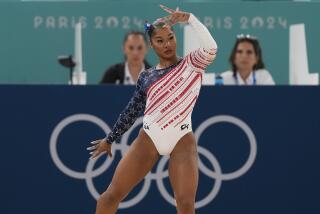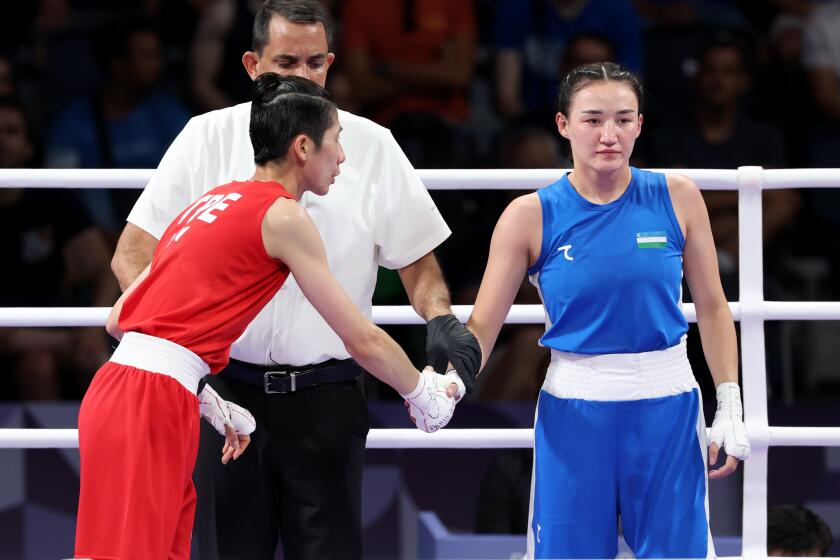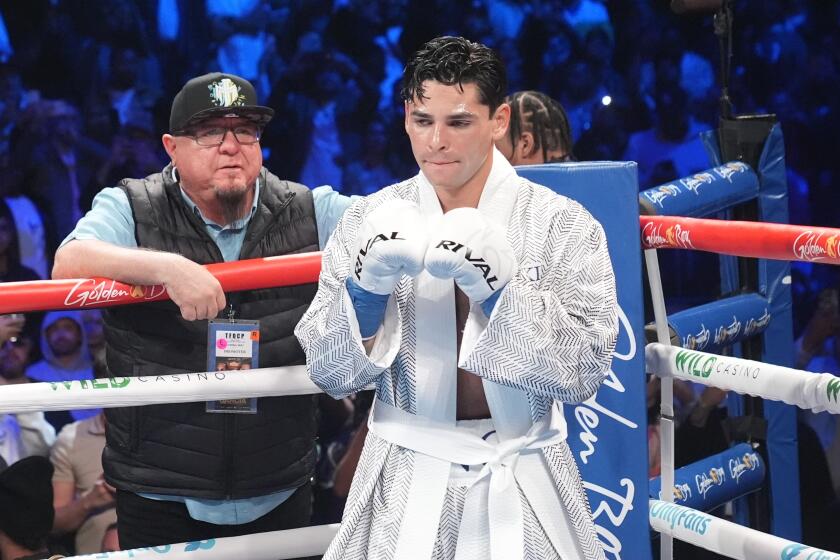Savon Is Savon, but Fights Are No Knockout
ATLANTA — Felix Savon, the saving grace.
At the end of a surprisingly shabby day of gold-medal fighting and unsurprising dodgy scoring Saturday at Alexander Memorial Coliseum, Savon did what Savon usually does:
He rose above it all, above the politics and the protests, the Cuba bashing, the Cuba praising and the Cuban expectations of a shower of gold.
In a classic, 20-2 destruction of Canadian David Defiagbon, who was hurt early and wisely went into a shell that kept him upright, Savon won his second consecutive Olympic heavyweight gold medal and gave Cuba its second gold of the day.
“That was a real gold-medal performance,” said American assistant coach Jesse Ravelo, comparing it to the rest of the day’s lackluster bouts.
Said Defiagbon, “We had a plan to throw rights when he dropped his left hand, but he was very smart. He didn’t make any mistakes.”
The victory, coupled with the earlier gold won by middleweight Ariel Hernandez, also a repeat Olympic champion, helped ease two earlier Cuban losses, including a strange decision against welterweight Juan Hernandez, who also took silver in 1992 when he lost a disputed decision to Ireland’s Michael Carruth.
After the decision Saturday giving Russian Oleg Saitov a 14-9 victory was announced, longtime Cuban Coach Alcides Sagarra raged in the corner, screamed at the referee, threw Hernandez’s gloves to the floor of the arena, then turned his back when Saitov jogged over for a handshake.
“The Cuban boxers and coaches are not accustomed to losing, and that explains their reaction,” said Russian Coach Nikolai Khronov, through a translator. “It’s only to be expected that they would react that way.
“It was not sportsmanlike, not at all.”
As has been the custom during these Games, the Cuban team refused to meet with reporters but hinted through intermediaries that Sagarra and the gold-medal winners might speak today.
For the observing American officials, whose complaints have rung loud around this venue for two weeks, the irony of the Cubans in a furor over the judging was not missed.
“I told Jerry [Dusenberry, president of USA Boxing] that we should file a protest on behalf of Cuba,” said David E. Lubs, executive director of USA Boxing.
Said U.S. Coach Al Mitchell, “It’s happened to Sagarra before, it’s happened to all of us. It’s a bad [scoring] system, and everybody knows it.”
It’s a system that produced perhaps the worst bout of the 300-plus fight tournament in the lightweight gold-medal round, when Algerian Hocine Soltani and Bulgarian Tontcho Tontchev turned in a dull bout that ended up tied, 3-3. And Tontchev scored three points only because he was given two of them when Soltani was penalized for slapping.
Soltani won the punch-count tiebreaker, 20-16, and the gold medal. But no fans.
“It’s that computer,” Ravelo said. “It’s taken the flavor out of the boxing. The fighters see what’s happening, and it’s boring now, because they’re afraid to mix it up. They’re scared to throw body shots and hooks because they know they don’t score.”
Other gold medals went to light-flyweight Daniel Petrov Bojilov of Bulgaria, who defeated Mansueto Velasco of the Philippines, 19-6, and bantamweight Istvan Kovacs of Hungary, who beat Cuban Arnaldo Mesa, 14-7.
After losing both Mesa and Juan Hernandez, the Cubans, who have three more fighters boxing today, lost their chance to come close to their Barcelona total of seven golds.
“There was no way--I told you that at the beginning,” Mitchell said of speculation that Cuba would get eight or nine golds here. “They got all the breaks in this tournament, and they’re still losing.
“If things were on the level, and they weren’t getting all the breaks, they would’ve gotten maybe two golds here,” he said, alluding to Ariel Hernandez and Savon.
For the United States, which did not have a fighter involved in Saturday’s action, the attention turns to the only gold-medal opportunity, when light-middleweight David Reid faces Cuba’s Alfredo Duvergel today.
Reid is a decided underdog, and the last time America failed to win at least one gold medal was in 1948.
“He’s not feeling any pressure,” Mitchell said. “He’s one of my inner-city kids. They don’t let the pressure get to them. You can’t intimidate David. He’s a street kid, he thrives on that sort of thing.”
But can Reid beat the reigning Pan Am Games champion?
“I’ve been watching Duvergel, and he’s been winning, but he’s just been surviving--not doing anything special,” Ravelo said. “If David fights like he did last night, he’s going to win.”
Said Reid, “I have a lot of pressure on me to step up and get us a gold. But, hey, if it was easy, I wouldn’t want the gold.”
(BEGIN TEXT OF INFOBOX / INFOGRAPHIC)
MEDALISTS
Boxing
106 POUNDS
Gold: Daniel Petrov, Bulgaria
Silver: Mansueto Velasco, Philippines
Bronze: Oleg Kiryukhin, Ukraine
Bronze: Rafael Lozanzo, Spain
119 POUNDS
Gold: Istrar Kovacs, Hungary
Silver: Armaldo Mesa, Cuba
Bronze: Rainkui Malakhbekov, Russia
Bronze: Vichairachanon Khadpo, Thailand
132 POUNDS
Gold: Hocine Softani, Algeria
Silver: Tontcho Tontchev, Bulgaria
Bronze: Terrance Cauthen, U.S.
Bronze: Leonard Doroftei, Romania
147 POUNDS
Gold: Dieg Satov, Russia
Silver: Juan Hernandez, Cuba
Bronze: Marian Simian, Romania
Bronze: Daniel Santos, Puerto Rico
165 POUNDS
Gold: Ariel Hernandez, Cuba
Silver: Malik Beyerogiu, Turkey
Bronze: Rhoshi Wells, United States
Bronze: Mohamed Bahan, Algeria
201 POUNDS
Gold: Felix Savon, Cuba
Silver: David Defiagbon, Canada
Bronze: Nate Jones, United States
Bronze: Luan Kfrasniqi, Germany
More to Read
Go beyond the scoreboard
Get the latest on L.A.'s teams in the daily Sports Report newsletter.
You may occasionally receive promotional content from the Los Angeles Times.










